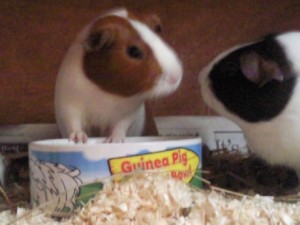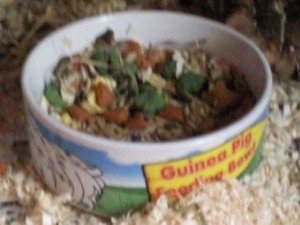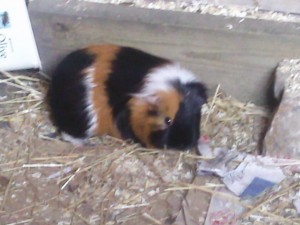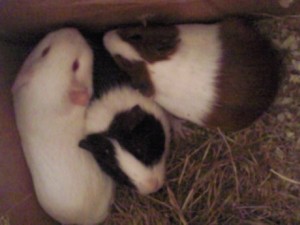What Do Guinea Pigs Eat?
 If you’re thinking of getting a guinea pig or two and you want to know all about their dietary requirements, then you’ve come to the right place. Or do you want to check your piggy is getting the essential nutrients that he or she needs? Either way this article has lots of essential information for guinea pig owners, so you’ll know exactly what a guinea pig should be eating.
If you’re thinking of getting a guinea pig or two and you want to know all about their dietary requirements, then you’ve come to the right place. Or do you want to check your piggy is getting the essential nutrients that he or she needs? Either way this article has lots of essential information for guinea pig owners, so you’ll know exactly what a guinea pig should be eating.
Grass – This should (hopefully!) be obvious. In South America wild guinea pigs can be found in grassland living in small herds. Guinea pigs are grazing animals so these wild creatures will be eating grass for most of the day. Pet guinea pigs should have grass available to them too, whether it is picked for them, or if they are in a grassy outdoor run – the second option is best as it gives them exercise. Make sure that the grass they eat has not been sprayed with chemicals or that other animals have fouled on it. Surprisingly grass is full of essential nutrients that guinea pigs need to stay healthy, the main one being fibre. Fibre helps to keep the animal’s bowel fully functional and keep the digestive system healthy. But, you should never feed your guinea pig wet grass as this can give them stomach ache. Don’t store wet grass you have picked in the hope of drying it out; this can cause harmful gasses to form which can make guinea pigs ill if they eat the grass. Instead they should be given hay.
Hay – Hay is a good grass alternative during the winter months when grass is wet and soggy. Hay is essentially ‘dried grass’ so it still contains a lot of fibre that your guinea pig needs to be a happy and healthy little piggy. There should always be a plentiful supply of quality hay for your guinea pig (remember in the wild they spend most of their time grazing). Hay is a good bedding material for your guinea pig and you may find they eat their bedding too. If this is the case try putting some extra hay in their non-sleeping compartment. I feed my guinea pigs hay all year round as well as grass in the summer months; in the winter when they don’t have grass, their amount of hay increases. I also find that my piggies prefer hay or grass to dried food, although fruit and veg always comes out tops!
 Dried (or supplementary) food – Many guinea experts say that you should give your guinea pig some form of supplementary food as it contains many different and essential vitamins that your piggy needs. Supplementary food for guinea pigs comes in many different forms: muesli, pellets and pouches are just a few. This food should be fed alongside the hay, grass and vegetables. There are two rules when it comes to choosing a dried or supplementary food for your guinea pig; 1) the food should be especially designed for guinea pigs, and guinea pigs only, 2) the dried food should have added vitamin C to it. This is because guinea pigs are the only rodents that can’t absorb vitamin C through their skin and so need to eat it. If they have a vitamin C deficiency then the guinea pig could easily contract scurvy which can be a fatal disease. For this reason don’t feed guinea pigs rabbit food as it doesn’t have enough vitamin C in it.
Dried (or supplementary) food – Many guinea experts say that you should give your guinea pig some form of supplementary food as it contains many different and essential vitamins that your piggy needs. Supplementary food for guinea pigs comes in many different forms: muesli, pellets and pouches are just a few. This food should be fed alongside the hay, grass and vegetables. There are two rules when it comes to choosing a dried or supplementary food for your guinea pig; 1) the food should be especially designed for guinea pigs, and guinea pigs only, 2) the dried food should have added vitamin C to it. This is because guinea pigs are the only rodents that can’t absorb vitamin C through their skin and so need to eat it. If they have a vitamin C deficiency then the guinea pig could easily contract scurvy which can be a fatal disease. For this reason don’t feed guinea pigs rabbit food as it doesn’t have enough vitamin C in it.
Fruit and Vegetables – It is important that your guinea piggy is fed these but not overfed (particularly the green, leafy vegetables) – a couple of vegetables (or fruit) about 4 or 5 times a week should be fine. I believe it to be ok to feed small amounts of carrots every day. If too many are fed to often it can lead to diarrhea. Vegetables are better for piggies than fruit, which should only be fed occasionally. Never feed frozen or cold vegetables to your pet as this can make them ill. They should always be at room temperature. If you over feed your guinea pig vegetables then you run the risk of your guinea pig having diarrhea, as vegetables can be quite rich. Be careful about which fruit and veg you feed to your guinea pigs as some are poisonous.
 SAFE fruit and veg for piggies are: Cabbage, Broccoli, Carrots, Kiwi (only feed in small amounts as it has a strong taste) Kale, Celery, baby tomatoes (I personally don’t feed any tomatoes to my pigs – if you do remove the poisonous green top and seeds/pips), Beetroot (this can stain fur and often turns the guinea pig’s urine red), small amounts of Cucumber, Parsley (Don’t feed parsley if the guinea pig is prone to bladder stones), dessert apple (remove core and pips, leave skin on), small amounts of Romaine Lettuce – don’t feed iceberg as this often gives them diarrhea and is very un-nutritional (I don’t feed my piggies lettuce often at all, and if I do only in small qualitites). Oh and Dandelion leaves make a tasty treat – the flowers are poisonous. The darker green a vegetable is the better it is for them. Broccoli, kale, cabbage should be given in small amounts as they can cause bloatedness in some guinea pigs.
SAFE fruit and veg for piggies are: Cabbage, Broccoli, Carrots, Kiwi (only feed in small amounts as it has a strong taste) Kale, Celery, baby tomatoes (I personally don’t feed any tomatoes to my pigs – if you do remove the poisonous green top and seeds/pips), Beetroot (this can stain fur and often turns the guinea pig’s urine red), small amounts of Cucumber, Parsley (Don’t feed parsley if the guinea pig is prone to bladder stones), dessert apple (remove core and pips, leave skin on), small amounts of Romaine Lettuce – don’t feed iceberg as this often gives them diarrhea and is very un-nutritional (I don’t feed my piggies lettuce often at all, and if I do only in small qualitites). Oh and Dandelion leaves make a tasty treat – the flowers are poisonous. The darker green a vegetable is the better it is for them. Broccoli, kale, cabbage should be given in small amounts as they can cause bloatedness in some guinea pigs.
Here is a quick list of fruit and vegetables they should never be given (I haven’t listed all of them, so if you’re unsure about something don’t feed it): Cauliflower, potato, raw beans (green beans should be ok ), rhubarb, cherries, oranges, nectarines, peaches and coconut.
Water – Fresh water should always be available to your guinea pig no matter what. I favour a water bottle over a bowl as guinea pigs can’t ‘mess’ in their drinking water this way.
 Brown Bread Toast – This is good for guinea pigs as it helps them to keep their teeth from getting too long. Provided it is brown bread used for the toasting then it gives them another source of fibre. I feed this to them about once every couple of months. I find one slice (broken into smaller pieces) is enough for 2 or 3 guinea pigs. Don’t feed white bread toast as it doesn’t have enough fibre.
Brown Bread Toast – This is good for guinea pigs as it helps them to keep their teeth from getting too long. Provided it is brown bread used for the toasting then it gives them another source of fibre. I feed this to them about once every couple of months. I find one slice (broken into smaller pieces) is enough for 2 or 3 guinea pigs. Don’t feed white bread toast as it doesn’t have enough fibre.
Sugary manufactured guinea pig treats should be limited.
So to sum up, never feed: chocolate, any kind of dairy product, process human foods, anything spicy, carbohydrate (exception of brown bread toast). Fresh water should always be available. Some guinea pigs may be allergic to or dislike certain vegetables, fruit, type of hay, dried food, supplementary food e.t.c. Remember: Never feed meat – guinea pigs are 100% vegetarian!
Unsure about something? Leave a reply in the form of a comment below and one of our Admin team will try to get back to you as soon as possible. (Remember to tick the box at the bottom of the form if you want the reply emailed to you).
 August 4, 2010
·
August 4, 2010
·  Maddia (Admin) ·
Maddia (Admin) ·  18 Comments
18 Comments
 Tags: cute guinea pigs, guinea pig as pets, guinea pig care, guinea pig food, guinea pigs eating, pet guinea pigs, what do guinea pigs eat · Posted in: Guinea Pig Care, Guinea Pig Information
Tags: cute guinea pigs, guinea pig as pets, guinea pig care, guinea pig food, guinea pigs eating, pet guinea pigs, what do guinea pigs eat · Posted in: Guinea Pig Care, Guinea Pig Information



18 Responses
Great info! Thanks
there is so much constroviousy about feeding guinea pigs i sometimes wonder who is right, on your list you say that guinea pigs should not have oranges cherries kiwi fruit yet other guinea pig sites say that these fruits are ok, so how does one tell who is rights..could you send me a daily menu for my pigs so that i am not giving the same thing over and over again.
thanks.
Hi Sandra,
Yes I agree – there is a lot of confusion over which foods you should and shouldn’t feed guinea pigs. My rule is if there’s any doubt, then don’t feed it.
As a rough guide here’s what a typical weekly menu of what I feed my piggies looks like:
Monday – Dried food, handful of grass and hay.
Tuesday – Dried food, hay, couple of pieces of carrot.
Wednesday – Dried food, grass and hay (maybe a few dandelion leaves).
Thursday – Dried food, hay, small pieces of broccoli or a little cabbage.
Friday – Dried food and hay/grass.
Saturday – Dried food, hay and grass, maybe a little bit of carrot.
Sunday – Dried food, hay and grass.
About once a month – Dried Wholemeal Toast or Apple Twigs.
It is important not to overfeed fruit/vegetables – about three times a week is good. Some days you could swap the veg for others e.g kale or cucumber.
Hay and/or grass should be available every day as it is a good source of fibre. I choose to give my piggies dried food every day too, though not too much, as it provides a balanced meal with lots of nutrients.
Hope this has helped :)
Hi, just a quick note to say after more research kiwi fruit is ok to feed guinea pigs in small amounts; the section above for safe foods now includes kiwi.
Another informative post on guinea pigs! I like reading your blog because you can always bring us new and awesome things; I feel that I must at least say a thank you for your hard work. Keep it up!!
Henry :)
Keep posting stuff like this i really like it! Good job friend!
Outstanding piece, thanks for sharing!
This is an epic post, maybe I should add add this blog to my blogroll? :)
Hello, sry for my bad english but Ih ave observed your website and would say that I come across your posts great since they have give me new ideas and new aspects. Many thanks for this details.
I’m sorry but most of what you’ve written is rubbish.
Kiwi fruit is really good for guinea pigs because it’s full of vitamin C.
Cauliflower is fine for guinea pigs.
And they should have fresh veg every day not every now and then.
Also your food bowl picture shows brightly coloured muesli type of food when pellets are much better as they stop guinea pigs only eating some bits and are not full of artificial colours as the muesli is.
Hi Kate, I’m very sorry you feel this way about this post.
Yes, I am aware that Kiwi fruit is a good source of vitamin C, and can be fed; I had not realised that ‘Kiwi fruit’ had been put into the ‘bad foods’ section and have subsequently changed it over. Thank you for pointing out this mistake. :)
Now as for Cauliflower, I have always maintained that this should not be given as it can cause gas production in the digestive tract, similar to the affects which can be cause by too much iceberg lettuce. In fact it was my local vet who first told me about this. I am aware that there is a lot of controversy over feeding this vegetable as it has proven fine for some guinea pigs. Because of this, I choose to avoid feeding it to my guinea pigs. After all, it’s better to be safe than sorry.
To be more specific it is the dark green and leafy vegetables (that sometimes have laxotive affects) that should not be given every day as it can cause the guinea pig to have sloppy stools. These such vegetables should be given about three or four times a week. I believe it is fine to feed the safe root vegetables, such as carrots, in small amounts everyday – although too much can make the animal ill.
Thank you for your point about the dried food, yes I quite agree that pellets can be a better food to feed guinea pigs as they can’t leave one particular type of nutrients. The ‘muesli type food’ in the picture is organic and has no artificial colours in, as that was one of the reasons I bought that brand of food for my guinea pigs and it gives them more variety (the packet says only natural flavours and colours have been used and no artificial colours of preservatives e.t.c have been added). Yes, I am aware that many different brands of this type of food do have artificial colours in, but I only buy the organic types and none of my guinea pigs do leave any of the food. I do also have some pellet food for them which I begin to feed them should they start to leave any of their other food. Thanks again for pointing this out.
Thanks so much for posting this!
I read your blog ever day and enjoy it, Great Post!
Hey, I haven’t checked in here for a while, but I will put you on my bloglist so I don’t forget to check back.
Thanks for the information I have got to questions which is are grapes ok and also I know that you have said not to feed them potatoes but what about potatoes skins??? Hope you can reply quick !!!!
Hi, from what I’ve researched, many people choose not to give their guinea pigs grapes as it can cause kidney problems which can be fatal. Some owners say that the occasional grape is fine (must be seedless) but guinea pigs very rarely like grapes.
I have five guinea pigs and have never fed any of them grapes; after all wild cavies wouldn’t eat them, and we want to give our pets a diet as close as possible to what they’d have in the wild.
Potato skins should also not be fed to your guinea pig as they can contain toxins (particularly if they’re green) which can harm your pet. So never feed potatoes or any part of them.
Hopefully this has helped you.
HI FOR MOSTLEY MY GUINEA PIGS DON’T EAT OR DRINK TO
MUCH
If you’re guinea pig continues to not eat or drink much you should take him or her to the vet immediately. Guinea pigs are prey animals in the wild, and so if they’re ill they try to hide the signs for as long as possible so predators won’t see them as an easy target.
Often piggies will have a day or too where they won’t eat much, but it should not last for more than three or four days.
Try to tempt your guinea pig to eat some of his favourite vegetables, hay or grass (not wet), or try a new brand of dried food.
If still he or she won’t eat consult a vet.